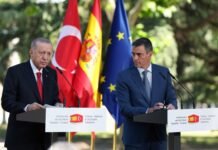Osman Kavala, a prominent businessman and rights activist who was sentenced to aggravated life in April, has said the prosecutors who drafted an indictment against him and argued that he had dinner with American academic Henri Barkey at a restaurant in İstanbul in 2016 knew this wasn’t the case.
In February 2020 Kavala and eight other defendants were acquitted of charges of attempting to overthrow the state through their involvement in the 2013 nationwide Gezi Park protests.
However, just hours before he was released, the İstanbul Chief Public Prosecutor’s Office issued a detention warrant for Kavala on charges related to a failed coup on July 15, 2016, in a move that was described by Kavala’s lawyers as a tactic to circumvent a ruling by the European Court of Human Rights (ECtHR).
The Strasbourg court had urged Kavala’s immediate release in December 2019, saying that his long pre-trial detention was a violation of his rights and that he hadn’t committed a crime as there was no reasonable suspicion in the Gezi indictment.
In the second indictment, the prosecutors accused Kavala of “attempting to overthrow the constitutional order” and “obtaining confidential information of the state for political or military espionage,” claiming that he collaborated with Barkey, who previously worked at the US State Department and is accused by Turkey of spying for foreign governments, and that the two had dinner at a restaurant in İstanbul on July 18, 2016, three days after the attempted coup.
Barkey, who was on İstanbul’s Büyükada island on the day of the coup for an international meeting as the then-director of the Middle East Program at the Woodrow Wilson Center, has been accused by the Turkish government and the pro-government media of being a CIA agent and among the organizers of the coup attempt.
Local media reports said at the time that the new indictment detailed the “relationship” between Kavala and Barkey as “new evidence” in reference to the alleged espionage, a charge of which Kavala was acquitted in the Gezi Park case.
Barkey, who had previously denied the allegations of involvement in the coup attempt and his contacts with Kavala, on Saturday released a written statement on Twitter saying that he was at the İstanbul restaurant on the said date to have dinner with “friend and journalist Aslı Aydıntaşbaş” and only had a “chance encounter” with Kavala and that the two chatted for a few minutes.
Please read my statement about my dinner at Karakoy restaurant on July 18, 2016. pic.twitter.com/dXZ9HNgoyp
— Henri Barkey (@hbarkey) August 6, 2022
Following the development, Kavala also released a written statement on his website on Monday, saying the prosecution in his case had known very well that he wasn’t the one who had dinner with Barkey days after the coup attempt.
Kavala stated that as a result of the investigation carried out at the restaurant, the police had found out who was sitting at which table that evening and that this information was also confirmed during his interrogation at the police station.
“Unlawful trials [in Turkey] are carried out on indictments prepared by prosecutors under political influence, who use methods of concealing, falsifying and interpreting [the facts] according to conspiracy theories. The claim that I had dinner with Henri Barkey at the Karaköy restaurant is a small but very illuminating example of this behavior,” he added.
An İstanbul court on April 25 sentenced Kavala, who had been behind bars without a conviction for over four years, to aggravated life and his co-defendants to 18 years each on charges of instigating the anti-government Gezi Park protests in 2013.
Barkey is also accused of links to the faith-based Gülen movement, which is inspired by the teachings of the Turkish Muslim cleric Fethullah Gülen, labeled by Ankara as a terrorist organization and accused of orchestrating the attempted coup in 2016, despite their strong denial of any involvement in the abortive putsch or any terrorist activity.
Turkish Minute













